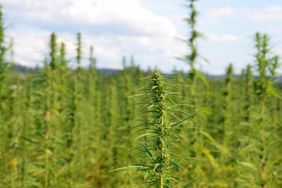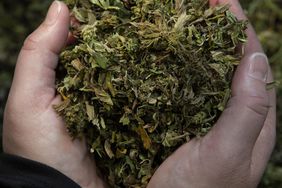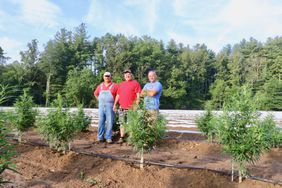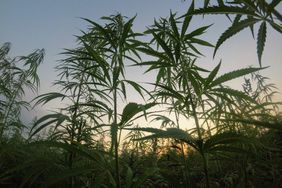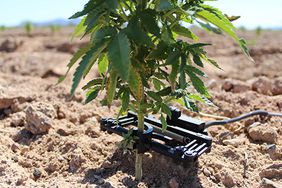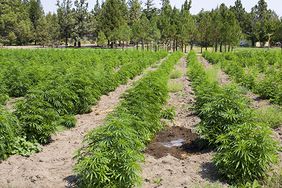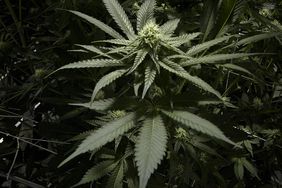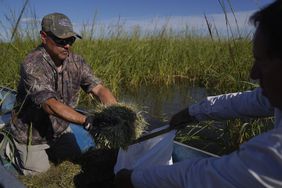:max_bytes(150000):strip_icc()/iStock-904560152-2000-54c52b6463a842e28fb87a6de4fe6e36.jpg)
For all its Gold Rush aura, hemp farming may be more like life on the frontier, where everything must be built from the ground up, said advocates of industrial hemp on Thursday. Hemp can require a lot of manual labor to keep weeds under control, it's hard to find processors for the crop, and marketing networks are rudimentary.
"Every facet of this industry is new and under development," said Derek Azevedo, a California farm executive who took part in a Washington fly-in by the newly formed Hemp Federation of America, a trade group. Federation members asked lawmakers and USDA officials for regulatory certainty for a new crop.
The 2018 Farm Bill legalized cultivation of industrial hemp, with the USDA to oversee state regulation of growers. The USDA issued regulations two weeks ago that essentially opened the gate for farmers across the nation to grow hemp in 2020. Cultivation in legal in 46 states, and all are expected to submit regulatory plans for USDA approval.
"Hemp is a very popular topic," said Kelly Deterding, a crop insurance executive and fly-in participant. "It is a very risky crop [but with] high reward."
Farmers planted 230,000 acres of hemp this year, three times as many as in 2018, according to the advocacy group Vote Hemp, which expects acreage to increase again in 2020. While the 2014 Farm Law allowed research and pilot projects, the 2018 Farm Bill created an opening for farmers looking for a new cash crop with better returns than corn, soybeans, or wheat.
Obstacles remain for hemp. Bankers are wary of hemp entrepreneurs — whether farmer, manufacturer, or retailer — for fear of being accused of handling illegal drug money. "No one is providing capital," said Mindy Joslin of HUB International Insurance Services. There have also been instances of police seizures of trucks transporting hemp to processors.
During visits on Capitol Hill, Hemp Federation members asked for legislation to clarify that it was legal for lenders to serve the hemp industry and for hemp to be shipped across state lines. They also asked the USDA to assure uniformity in state regulations. In addition, the group wants assurance that immigrants seeking U.S. citizenship will not be penalized for working in the hemp industry. At present, employment in the cannabis industry is an "exclusionary activity" for citizenship.
Industrial hemp is differentiated from marijuana by having less than 0.3% tetrahydrocannabinol, the psychoactive substance that makes marijuana users high.
While cannabidiol (CBD) is the hot-selling hemp product at present, long-term success may be in food and fiber applications, said Mike Gaynier, a specialist in agricultural insurance who is planning to experiment with hemp next year. "We have to attract processors to the industry." At the moment, processors tend to be "boutique" size rather than the large-scale operators capable of handling agricultural volumes, said Gaynier and Azevedo. "You can grow a lot more hemp than you can process," Azevedo said.
Will Wheeler, a farmer from Chickasha, in central Oklahoma, said he hoed weeds by hand last summer because no herbicides are currently approved for use on industrial hemp. "This is a very labor-intensive crop," said his neighbor Jeff McVey, who described his interest in hemp this way: "Looking for a better way. Something that will make us a dollar."
There is no shortage of trade groups to support the fledgling industry. The Hemp Federation, which says it represents the entire industry, from grower to manufacturer, is one of several groups representing industrial hemp. The nonprofit Hemp Industries Association, formed in 1994, "stands for fair and equitable treatment of industrial hemp." The National Hemp Association, which is "dedicated to helping American farmers earn a living growing this environmentally sustainable cash crop," estimates the U.S. hemp market is worth more than $600 million a year but says it is currently dominated by imports. The Hemp Farmers Association specializes in "advising hemp farms on established best practices, from seed to sale."
Since 2000, Vote Hemp has campaigned for "a free market for industrial hemp, low-THC varieties of cannabis" and the legalization of hemp. A cooperative, the American Hemp Association, says, "We are here to protect farmers from the so-called 'industry' to make sure America thrives." The U.S. Hemp Roundtable, launched in 2017, describes itself as a coalition of hemp companies — "from seed to sale" — and grassroots groups focused on the long-term viability of the industry. The American Trade Association for Cannabis and Hemp promotes "businesses engaged in the legal trade of industrial, medical, and recreational cannabis and hemp-based products."
The USDA home page for hemp and farm bill programs is available here.
